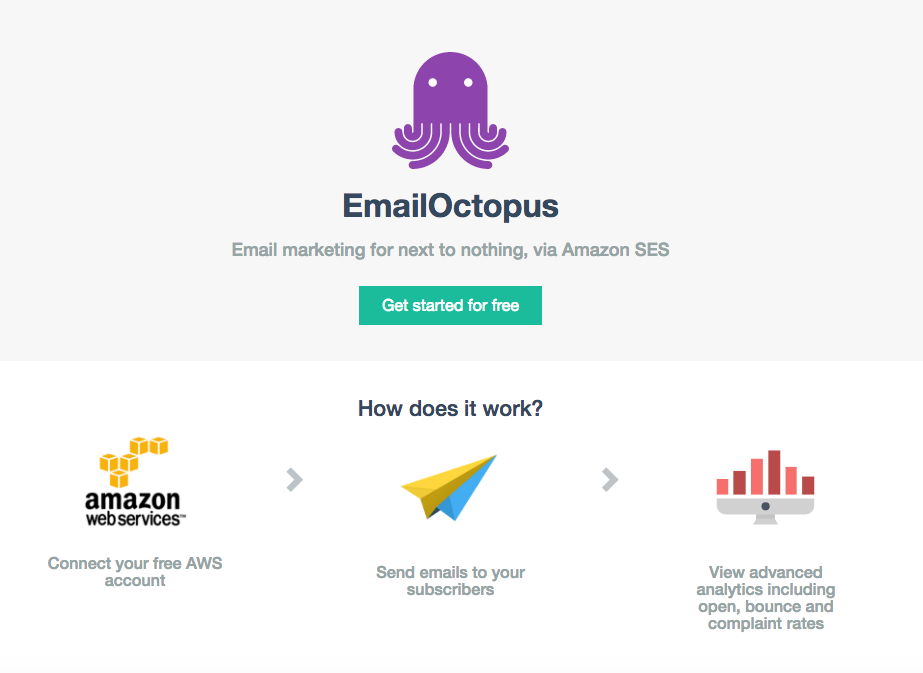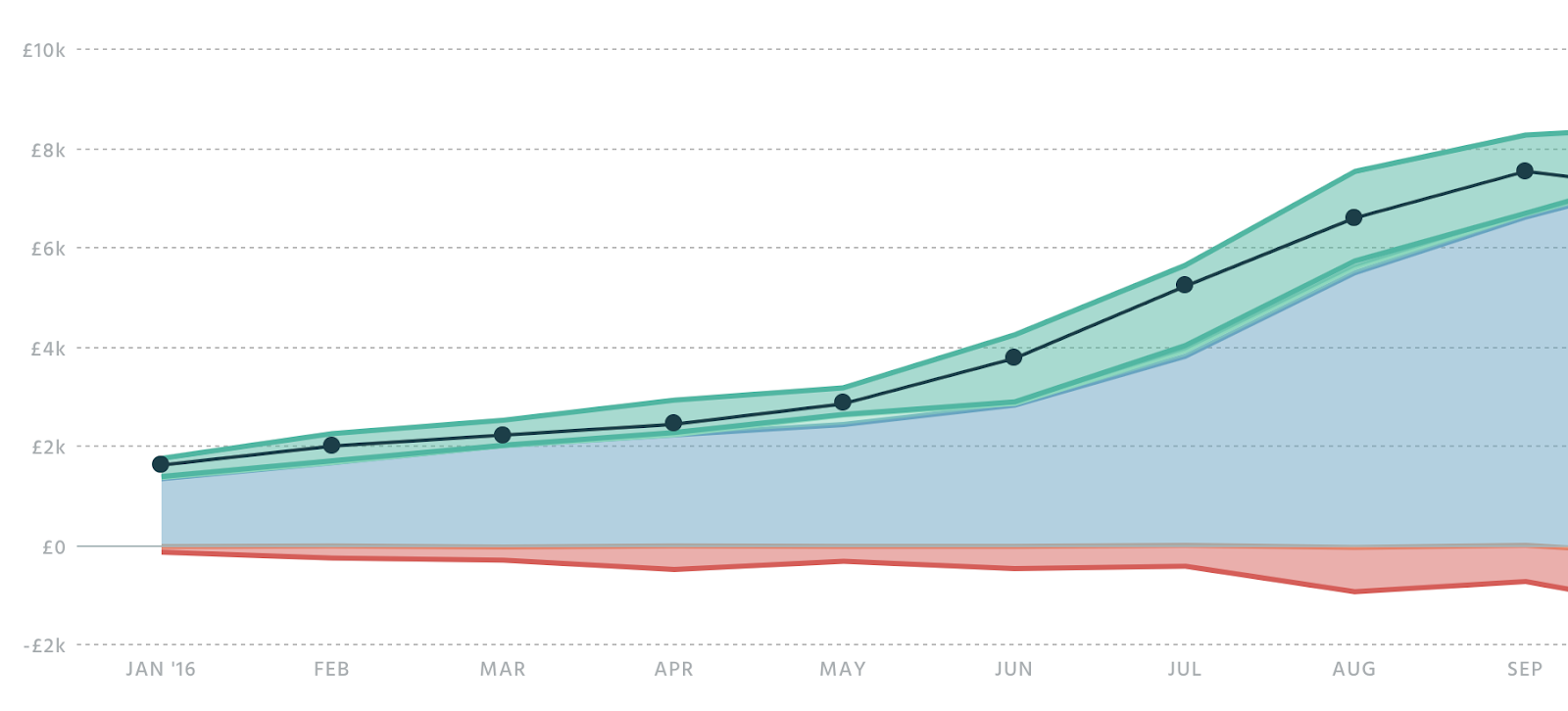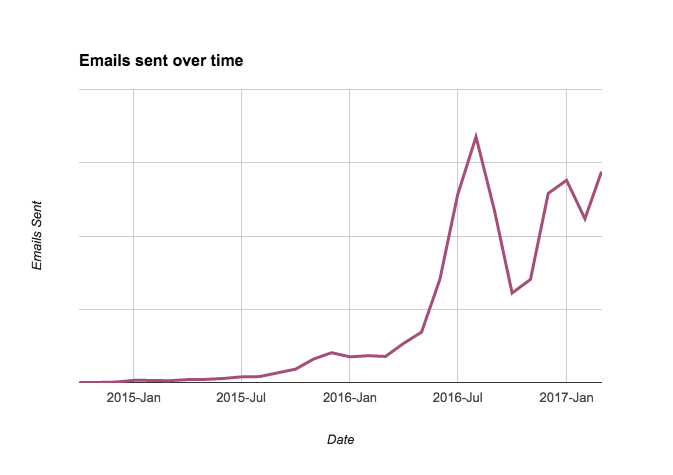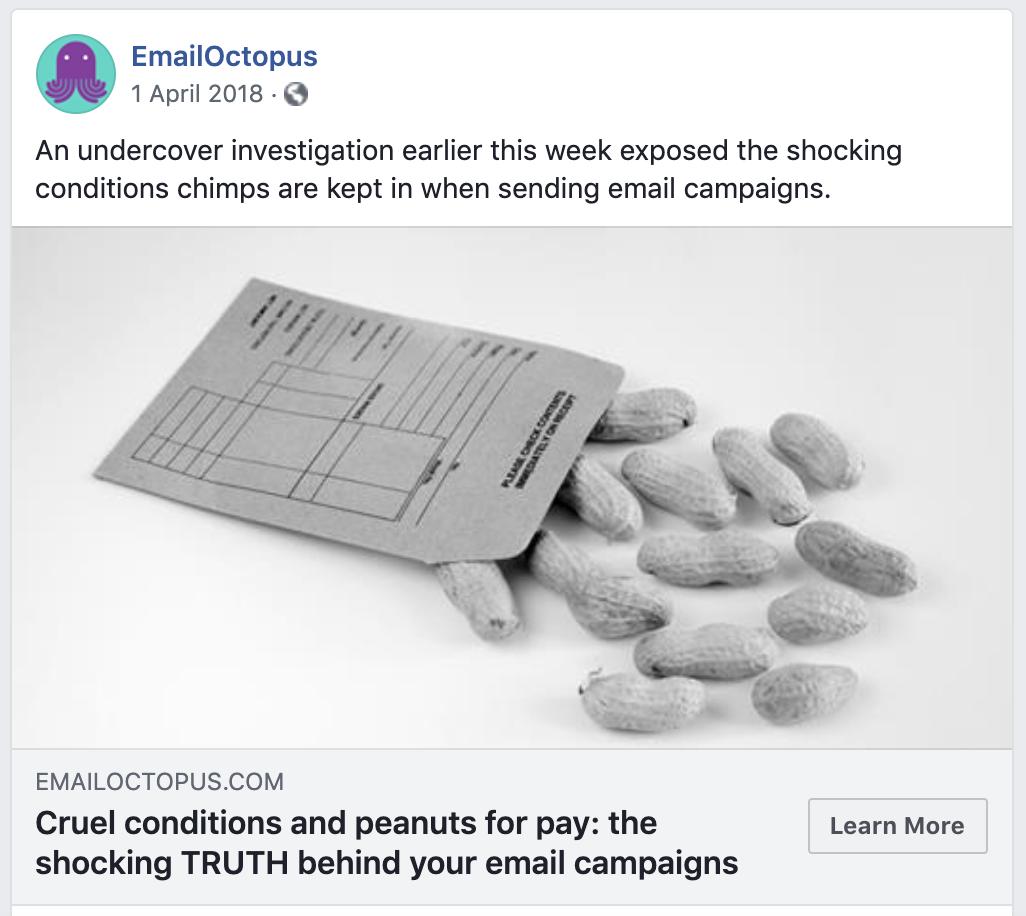Growing EmailOctopus, a small side-project into a £1m business
Just under 3 years ago, in December 2016, Jonathan and I went full-time on EmailOctopus. We’d reached ‘ramen profitability’, the point where we could just about cover our living expenses (in London, which is not cheap!) and the cost of running EmailOctopus. Now, 3 years on, we’ve reached another big milestone — £1 million in revenue.
So how did we get there? What have we learned? And what advice has been invaluable in growing EmailOctopus from a small side project to a team supporting thousands of users?
Starting a business does not need to be do or die
While it was 3 years ago that we both went full-time, there was a lot of work that went on behind the scenes before that. The first line of code was written back in the middle of 2014, 5 years ago. Our first paying customers joined towards the end of 2015.
Starting a business does not need to be a case of abandoning your job, taking huge risks and ploughing everything into it. We carefully managed our transition, with Jonathan running the business as a side-project before identifying he needed some assistance in growing it. I joined initially on a contract basis, helping out 3 days a week alongside other contract roles. Jonathan negotiated his existing role, allowing him to spend 2 days a week on EmailOctopus until he was ready to go full-time. It wasn’t until we both could afford to pay ourselves that we took that leap.

Going full-time accelerated EmailOctopus’s growth massively; perhaps with the benefit of hindsight we played it too safe — but it is possible to start a business as a side-project — almost risk free — before developing it into a million pound business.
There are so many things out of your control
When starting your own business you want everything to be in your control. It’s one of the reasons I often hear given when speaking to people about leaving their job. The truth is, rather than reporting to a manager or CEO you now have responsibilities to your customer and more seriously, the government or those who legislate. As a UK headquartered business the last few years have been filled with uncertainty and things outside of our control.
In 2016, from June through to July we saw a huge increase in revenue for EmailOctopus. Our secret to this growth? We sold our service in USD, so when Britain voted to leave the EU, the pound crashed by 20% and our GBP revenue grew by that same amount. It’s something we never considered and it was a hugely welcome surprise, one which allowed us to go full-time on the project a few months sooner. Anyone familiar with UK politics knows that the result could have easily have gone the other way and we’d have been impacted adversely. That uncertainty and awareness that there are things outside of our control does lead us to be a bit more cautious and also mitigate these risks where possible.

Legislation also impacts us in other ways. The GDPR in 2018 and SCA 2019 have both required us to carefully read legislation, engage lawyers for guidance and in both instances, make changes to EmailOctopus. We’re a SaaS business that operates worldwide and it’s highly likely there will be future legislation from other regions of the world that we will need to adapt to. At present it feels like 3-months of our product roadmap every year will be dedicated to legal compliance. Don’t get me wrong, being able to dictate the broad direction of the business is much more exciting than being a small cog in a machine, but there is still responsibility, and boxes to tick — with bigger consequences if you fall short.
Growth is not always good
Like most businesses we have a dashboard full of KPIs (Key Performance Indicators). We look at things such revenue, customers, accounts created and our ‘north star metric’, the amount of users who send a campaign in their first few days. There have been times where these have all been filled with green arrows, yet the business wasn’t as healthy as it should be. Metrics only give you one view of the business and sometimes you need to dive a little deeper to understand what’s really going on.
As an email marketing platform which can be used to reach millions of people in a matter of minutes we open ourselves up to being used by less than ideal users. We’ve had days where we’ve been jumping for joy (or hitting the pub at 5pm) because we’d acquired 20 new customers, however a few days later those customers turn out to be sending vast swathes of questionable content through our platform. In the early days we simply hadn’t planned for this and while the money rolled in and graphs were going ‘up and to the right’ we had a major issue on our hands. As a new business, still a side-project at the time, it’s hard to turn down revenue, but with reputation, morals and legal issues all at stake we ended up ceasing work on all feature development and focussing on introducing more checks into our platform to monitor the usage and reputation of our users.

There have been users whose content is a shade of grey, and these are the ones which have kept both Jonathan and I up at night as we question what’s the best approach. Like Facebook and other huge companies before us, we’ve had a fair share of politics and opinions shared through EmailOctopus which we really don’t quite agree with. And that’s where it becomes difficult. To what extent should our own personal views influence the platform? And who are we to say that our own personal views are correct? It’s an incredibly difficult moral problem, made only more difficult by the fact that we have a business to run. For now, our approach has been to focus on the legality of the emails and not focus on which side of the political spectrum the emails may fall — though I’d be interested to hear how other businesses deal with this issue, particularly as they grow and their team’s opinions become more varied too.
Competing in a competitive market is possible
At every meetup I go to there are wannabe entrepreneurs saying something along the lines of “I want to start my own business, but I don’t have an idea”. EmailOctopus, I think, is a testament to the fact that you don’t need to have a super, new, innovative idea to succeed. And in many ways it can be easier to enter an already established market.
By building a product which already exists, but executing differently, you don’t have to worry if there is a market there. There are hundreds of email marketing platforms — of course there’s a market.
Moving into an established space with multiple competitors means you don’t have to invest significant sums in user or product research — you can simply look at the incumbents, their best features and read a number of reviews on Capterra regarding users pain points. Through a days research you can very easily build a picture of what users in that market require and don’t like, to which you can build a product which solves those. In our case, we look at MailChimp, the email marketing industry leader. On the first page of their Capterra listing there are 5 reviews mentioning ‘expensive’, that’s 20% of their reviews. For each and every market there are similar opportunities, waiting to be tapped into.
A competitive market does make it tough when bidding for attention and looking to acquire users, though. The average CPC (cost per click) for the keyword ‘email marketing’ is around £40 which is why it’s important to execute and market differently to the other, much larger, players in the industry. Instead of trying to compete on Google or Capterra we focus on growing our business via word of mouth. We focus on doing customer support well, offering live chat and email support across all plans. We get to know many of our customers and they know they can speak to anyone on our team and get an expert answer. As we’ve gotten to know them as people we encourage them to spread the word and let them know how important their feedback is to us, on both public and private channels.
Sometimes you will lack motivation
One thing that isn’t spoken about enough by founders is the lack of motivation. Sometimes there are days or weeks where a Gary Vee video just doesn’t quite get you pumped up enough. Ploughing through, writing code that might not become a product for months takes incredible patience and motivation. As does pushing on to reach the next milestone after you’ve reached that target you wanted to hit.
Having a co-founder, as Jonathan did with Gareth, or a whole team, as we have now, helps when perhaps the passion to push the business forward isn’t quite there. As we’ve grown, additional motivation and excitement comes every time we hire — after working on the business for years it’s incredibly easy to get lost in the day-to-day, to focus on yet another Google Ad campaign or another feature. Each hire brings additional insights and excitement; when our first developer Ben was hired he opened our eyes to simplifying our email builder — something we’d written off as a project too difficult and one to use a suboptimal 3rd party plugin for. When we hired Albert, the face of our excellent support team, he turned something menial into something that now excites us. By abstracting ourselves away from those day-to-day tasks we can see the bigger picture, we can see more possibilities, we can focus on long-term improvements to remove the monotonous nature of some of them and now it’s a genuine pleasure to occasionally pop back and write a line of code, or answer a support ticket.

You’ll receive tonnes of advice
If there is one thing guaranteed when starting a business it’s advice. Advice will come from all angles. Previous employers, friends, family — they’ll all have ideas on how you can make this business a success. It’s a little bit more lonely when you’re looking for your first customer though…
Separating the good advice from the bad is difficult. Advice is just that one person’s experience, filled with bias and often not relevant. Someone who has run a successful VC-backed fashion business is without doubt an excellent entrepreneur, but running a bootstrapped software business is different and it’s important to take into account the differences when receiving that advice.
There’s also a lot of plain bad advice out there, much of it given as gospel on Twitter or Indie Hackers. How many times have we read that it’s bad to create a software business and compete on price? Why does everyone advise that you do sales before marketing? Naturally there’s some survivorship bias when I say ignore that advice. But us surviving, while doing the complete opposite, tells you that the advice shouldn’t be taken as essential.
In our experience, it’s important to build a sounding board, filled with people you admire, people who understand your situation, your strengths and have ideally been there before. In the early days we were incredibly fortunate to share an office with Jonny from Ticket Tailor and Abs from Payhip. When everyone else was saying that starting an email marketing business was bad, they were competing against Silicon Valley giants such as Eventbrite and Gumroad and making it work. Beyond the broader, strategic advice, these people can also give you incredible help which is often more tactical in nature. The nightmare which is VATMOSS, was made much simpler by virtue that both Jonny’s and Abs’s business had been through that exact process only a couple of years later.
The advice goes both ways too — and all of our businesses have gone on to flourish as a result.
Building a brand
Building a brand, especially in a competitive market place is incredibly important. In the early days of EmailOctopus, we tried to talk ourselves up. Despite being only Jonathan and I working on the project, we’d make references to ‘our team’. We very much took a ‘fake it till you make it’ approach. But that wasn’t us. Brands and businesses work best when they reflect the people that run it. Steve Jobs, the perfectionist, was Apple. Tesla is Elon Musk.
After a brand away day and discussions with Anna (Jonathan’s wife, with an excellent eye for brand) we sought to change that. We moved towards a friendlier approach. More fun and playful. Something we could be proud of and was very much us. We try to be open and honest, without being boastful and hopefully this blog reflects that too.
Running EmailOctopus has allowed us to run a business which we enjoy working in and I believe our customers can see that. We don’t spend tons on marketing (we’ve probably spent £15,000 on ads since we started) because we know how annoying advertising can be. We’ve sent no more than 100 cold emails because we don’t like receiving them (and I’d question whether it’s a good look for an email marketing provider to be sending spam…). We focus very much on building relationships with our users which then, as previously mentioned, encourage them to spread the word.
We do have some fun at the same time too. April Fools Day is one of those days which has always allowed us to bring out our playful nature a little more, whether it be EmailSocktopus, where we ‘launched’ a sock brand, or whether it be the time we joked one of our competitors was enslaving chimps to send their emails (and they were paying them peanuts!)…

Our focus is very much on producing a quality product, which is fun and honest. Probably how we’d describe ourselves too…
So what’s next?
All of this is based off our (limited) experience, with £1m in revenue a milestone — by no means would we consider ourselves experts, yet. Milestones are important to celebrate as they allow us to look at how far the business has come, but it’s only part of our continuing journey. We hope to continue to learn more, to continue to run the business in a considerate, kind manner and to see EmailOctopus continue to grow.
Do we sound like a company you’d want to join? We are hiring for marketers (to push us beyond our comfort zone) and developers, who can help drive us to that next big milestone, whatever that may be. Do get in touch if you’re interested.
And if you’re looking for a reasonably priced email marketing platform, with excellent personal support, sign up here.